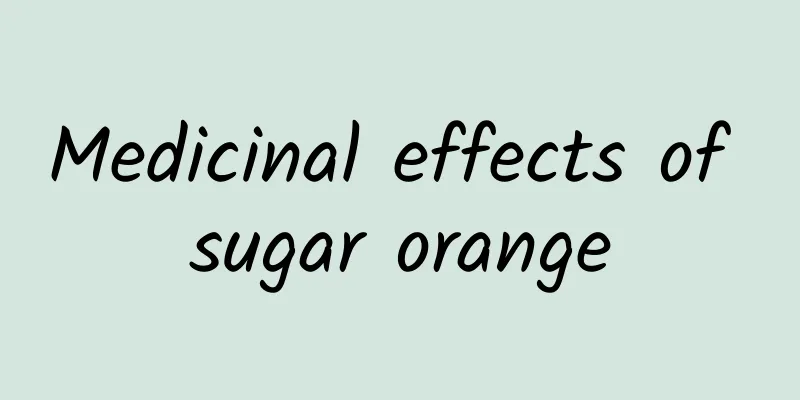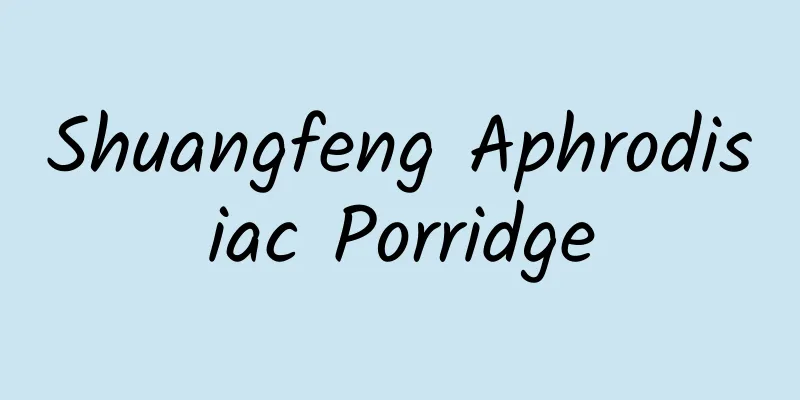Medicinal effects of sugar orange

|
What I’m going to introduce to you below is the nutritional value of sugar oranges. I hope you like it and learn more about it. Sugar orangeTangju is a traditional local specialty of Guangning and Sihui, and is also a famous and high-quality variety of citrus. It was praised by the Yangcheng Evening News as "a unique tangju". Tangju fruit is oblate, with a tumor-like protrusion on the top, a sunken navel end, orange-yellow color, thin wall, and easy to peel. The fruit shape index is 0.78, the weight of a single fruit is 62-86 grams, the edible rate is 71%, and the soluble solids are 11%. Every 100 ml contains 10.55 grams of total sugar and 0.35 grams of fruit acid. The flesh is crisp, juicy, slag-free, and sweet. After eating, it is refreshing and intriguing. This product is well-known both at home and abroad. In the 1960s and 1970s, it was sold in large quantities in Southeast Asia and Hong Kong and Macao. Medicinal effects of sugar orangeTangerine peel is pungent and bitter in taste, warm in nature, and enters the spleen, stomach, and lung meridians. It has the functions of regulating qi and lowering adverse reactions, regulating the middle and stimulating appetite, and drying dampness and resolving phlegm. It is mainly used to treat spleen and stomach qi stagnation and dampness obstruction, chest fullness and stuffiness, abdominal distension and pain, loss of appetite, vomiting, poor bowel movements, lung qi obstruction, cough and sputum, and also treats the initial stage of mastitis. After years of research, it is now known that tangerine peel has many pharmacological effects. Tangerine peel decoction has very few side effects, and no acute poisoning has been found in multiple animal tests. People with qi deficiency syndrome, yin deficiency and dry cough, vomiting blood syndrome, red tongue with little fluid, and internal heat should take it with caution. 1. Effect on the digestive system: The volatile oil contained in tangerine peel has a mild stimulating effect on the gastrointestinal tract, which can promote the secretion of digestive juice and eliminate gas accumulation in the intestine, showing the effects of aromatic stomachic and wind-expelling and gas-removing effects. 2. Effects on the cardiovascular system: Tangerine peel decoctions and alcohol extracts can excite the myocardium, but excessive doses can cause inhibition. In addition, it can also cause slight contraction of blood vessels and rapidly increase blood pressure. The pectin in tangerine peel also has a certain preventive effect on arteriosclerosis caused by a high-fat diet. 3. Effect on the respiratory system: The volatile oil contained in tangerine peel has a stimulating passive expectorant effect, making sputum easier to cough up. Tangerine peel decoction has a weak dilating effect on the bronchi. Its alcohol extract has a high antiasthmatic effect. 4. Effect on the urinary and reproductive system: Tangerine peel decoction can cause renal blood vessels to constrict and reduce urine volume. 5. Anti-inflammatory effect: The decoction of tangerine peel can be used together with vitamin C and vitamin K to enhance the anti-inflammatory effect. |
<<: Orange marmalade ingredients and recipe
>>: What are the special things about eating sugar oranges?
Recommend
The efficacy and function of Zhongki No. 1 kiwifruit
Do you know the efficacy and function of Zhongmi ...
What about custom picture frames? Custom picture frame reviews and website information
What is Picture Frames, Custom Made? Picture Frame...
How is Dubai Ports World? Dubai Ports World reviews and website information
What is the website of DP World? DP World is one o...
How is the Qidian software? Qidian software review and website information
What is Check Point Software? Check Point Software...
Loquat production environment and varieties
Loquat tastes very fragrant and sweet, and is kno...
The benefits of eating clams
Clams are the most common seafood in life. They a...
How to make delicious dried carambola? Steps of making dried carambola
Star fruit is a fruit with very high nutritional ...
The efficacy and function of Kyoho grapes
There are many varieties of grapes, including Kyo...
What is The Pokemon Company like? The Pokemon Company reviews and website information
What is the Pokémon Company website? The Pokémon C...
What is Fizik like? Fizik review and website information
What is Fizik? Fizik is an Italian brand that spec...
What is beetroot? What are the benefits of beetroot?
Beetroot, also known as beetroot, is a herbaceous...
The efficacy and function of hawthorn wine
Hawthorn is a fruit with a particularly sour tast...
Ingredients and steps for making tomato juice
Tomato is a special ingredient that can be used a...
How to make chili sauce with dried chili peppers
Many people like to eat spicy food. Spicy food, a...
Fritillaria porridge recipe
The method of making Fritillaria porridge is actu...









